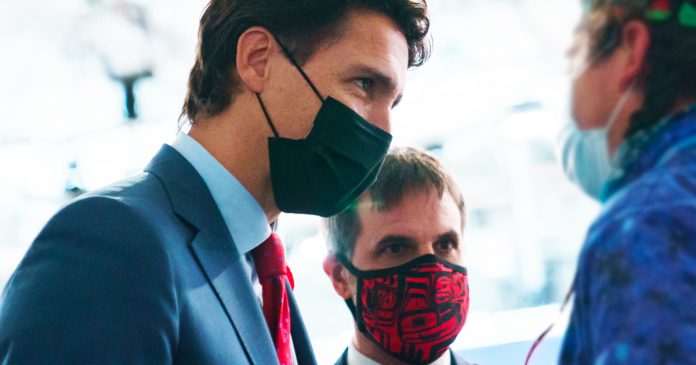If you consumed your political news entirely from much of the legacy media, you could be forgiven for thinking the top story in the country was the private medical history of a handful of Conservative MPs.
The topic, after all, dominated political talk shows on CBC, CTV, City News, CPAC and Global News, as well as newspaper columns and radio shows.
With MPs returning to Ottawa for the first time since the September election, and Parliament sitting for the first time in over five months — the first time since June! — you would think there were more pressing topics for the news media to focus on.
Health exemptions and the vaccine status of a handful of MPs just doesn’t seem very important when compared with some of the major fiscal, economic and weather-related concerns of the day.
For instance, a catastrophic storm system and heavy rain led to mudslides and flooding in southern British Columbia, killing at least four people, forcing 17,000 out of their homes and causing billions in direct and indirect damage.
Prime Minister Justin Trudeau talks a good game about the “climate crisis” but he doesn’t seem to put his money where his mouth is. Canada, we just learned, is the worst performer in the G7 when it comes to lowering our greenhouse gas emissions, contrary to Trudeau’s pledges and rhetoric.
And when it comes to the work of adapting to a changing climate and preparing for more intense storms that come as a result of the changing climate, Trudeau is nowhere to be found.
Turning to Trudeau’s fiscal record, the picture is even more bleak.
Trudeau pledged to help Canadians make it through the pandemic and resulting lockdowns by borrowing money on our behalf and paying Canadians directly through programs like CERB.
This program had a devastating impact on small businesses, many of whom had to shut their doors permanently because of heavy-handed lockdowns.
The ones who managed to stay in business are still reeling from the consequences of the Trudeau-bucks program. With unemployment levels still much higher than pre-COVID, there are over one million job vacancies in Canada today.
Many small businesses are desperate for workers, and yet, many Canadians are more content to stay at home.
Trudeau’s spending and borrowing bonanza is having deeper and darker consequences.
Trudeau borrowed so much cash that the Bank of Canada resorted to the mass printing of money — increasing the money supply by more than 20% over the past two years — to keep up. With more dollars flooding the market, each dollar is worth less — a phenomenon known as inflation.
The recent rapid increase in inflation has led to sky-high prices in grocery stores, hardware stores, gas stations and malls when buying Christmas gifts, making life even more unaffordable for working Canadians.
With low interest rates designed to encourage borrowing, and investors looking for hedges against inflation — namely buying hard assets like real estate — Canada’s ill-begotten monetary policy is making home ownership even more out-of-reach for young Canadians.
I could go on and on and on.
So why did the topic of vaccine exemptions for MPs dominate the news cycle last week?
It’s simple. Because partisan Liberals call the shots. They decide what the news cycle will look like simply by unleashing an attack at their political opponents. It happens all the time.
Whatever talking points the Liberals come out with on Monday morning will be repeated over and over again throughout the week by an army of loyal journalists.
These journalists buy into the Trudeau narrative, hook, line and sinker. So rather than talking about the important issues of the day — issues that have a real impact on Canadians — we’re stuck hearing about the private medical history of a handful of MPs.
No wonder Canadians are tuning out.
